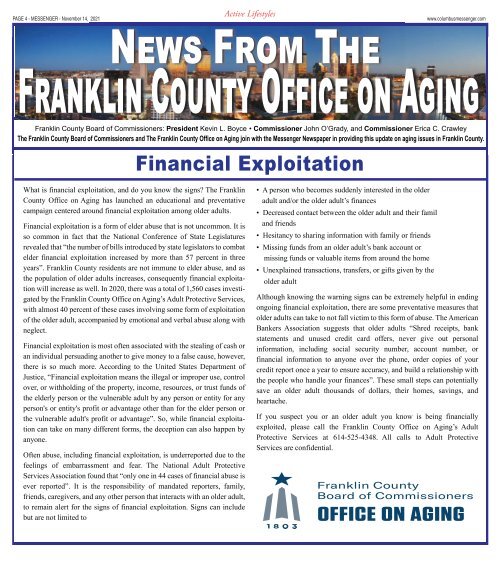South Messenger - November 14th, 2021
Create successful ePaper yourself
Turn your PDF publications into a flip-book with our unique Google optimized e-Paper software.
PAGE 4 - MESSENGER - <strong>November</strong> 14, <strong>2021</strong><br />
Active Lifestyles<br />
<br />
www.columbusmessenger.com<br />
<br />
Franklin County Board of Commissioners: President Kevin L. Boyce • Commissioner John O’Grady, and Commissioner Erica C. Crawley<br />
The Franklin County Board of Commissioners and The Franklin County Office on Aging join with the <strong>Messenger</strong> Newspaper in providing this update on aging issues in Franklin County.<br />
Financial Exploitation<br />
What is financial exploitation, and do you know the signs? The Franklin<br />
County Office on Aging has launched an educational and preventative<br />
campaign centered around financial exploitation among older adults.<br />
Financial exploitation is a form of elder abuse that is not uncommon. It is<br />
so common in fact that the National Conference of State Legislatures<br />
revealed that “the number of bills introduced by state legislators to combat<br />
elder financial exploitation increased by more than 57 percent in three<br />
years”. Franklin County residents are not immune to elder abuse, and as<br />
the population of older adults increases, consequently financial exploitation<br />
will increase as well. In 2020, there was a total of 1,560 cases investigated<br />
by the Franklin County Office on Aging’s Adult Protective Services,<br />
with almost 40 percent of these cases involving some form of exploitation<br />
of the older adult, accompanied by emotional and verbal abuse along with<br />
neglect.<br />
Financial exploitation is most often associated with the stealing of cash or<br />
an individual persuading another to give money to a false cause, however,<br />
there is so much more. According to the United States Department of<br />
Justice, “Financial exploitation means the illegal or improper use, control<br />
over, or withholding of the property, income, resources, or trust funds of<br />
the elderly person or the vulnerable adult by any person or entity for any<br />
person's or entity's profit or advantage other than for the elder person or<br />
the vulnerable adult's profit or advantage”. So, while financial exploitation<br />
can take on many different forms, the deception can also happen by<br />
anyone.<br />
Often abuse, including financial exploitation, is underreported due to the<br />
feelings of embarrassment and fear. The National Adult Protective<br />
Services Association found that “only one in 44 cases of financial abuse is<br />
ever reported”. It is the responsibility of mandated reporters, family,<br />
friends, caregivers, and any other person that interacts with an older adult,<br />
to remain alert for the signs of financial exploitation. Signs can include<br />
but are not limited to<br />
• A person who becomes suddenly interested in the older<br />
adult and/or the older adult’s finances<br />
• Decreased contact between the older adult and their famil<br />
and friends<br />
• Hesitancy to sharing information with family or friends<br />
• Missing funds from an older adult’s bank account or<br />
missing funds or valuable items from around the home<br />
• Unexplained transactions, transfers, or gifts given by the<br />
older adult<br />
Although knowing the warning signs can be extremely helpful in ending<br />
ongoing financial exploitation, there are some preventative measures that<br />
older adults can take to not fall victim to this form of abuse. The American<br />
Bankers Association suggests that older adults “Shred receipts, bank<br />
statements and unused credit card offers, never give out personal<br />
information, including social security number, account number, or<br />
financial information to anyone over the phone, order copies of your<br />
credit report once a year to ensure accuracy, and build a relationship with<br />
the people who handle your finances”. These small steps can potentially<br />
save an older adult thousands of dollars, their homes, savings, and<br />
heartache.<br />
If you suspect you or an older adult you know is being financially<br />
exploited, please call the Franklin County Office on Aging’s Adult<br />
Protective Services at 614-525-4348. All calls to Adult Protective<br />
Services are confidential.


















